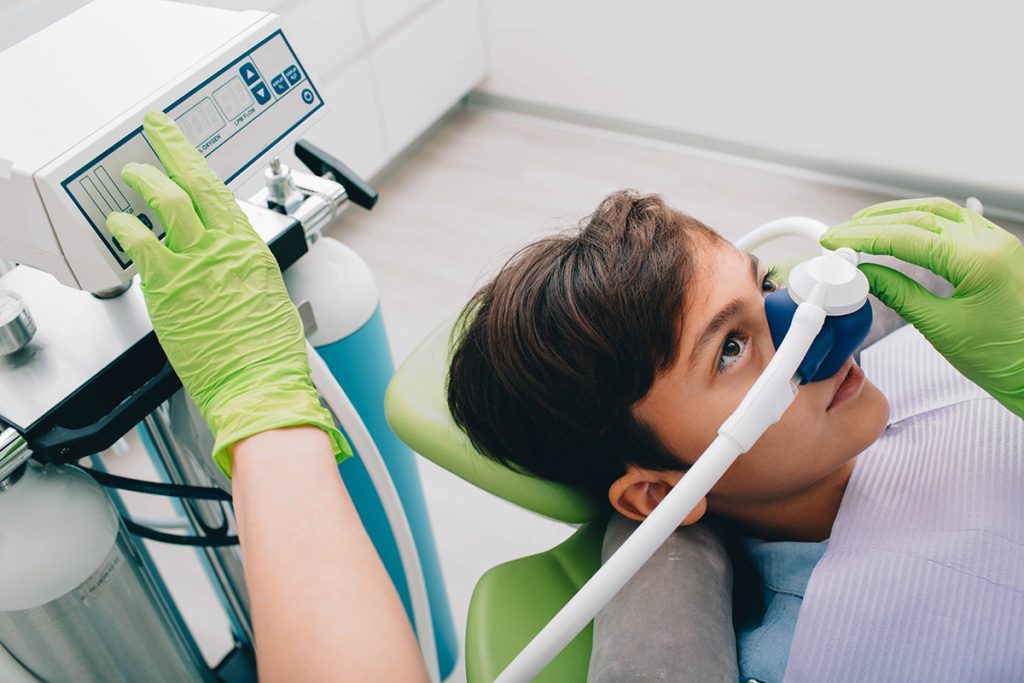Conscious Sedation / Laughing Gas in Pune
Conscious Sedation / Laughing Gas in Pune
Conscious sedation using nitrous oxide, commonly known as laughing gas, is a popular and effective method in pediatric dentistry to manage anxiety, improve comfort, and facilitate a smoother dental experience for children.
Overview of Nitrous Oxide Sedation
Nitrous Oxide (Laughing Gas):
Nitrous oxide (N2O) is a colorless gas used for its anxiolytic (anxiety-reducing) and analgesic (pain-relieving) effects.
• Administration: Delivered through a small mask placed over the child’s nose, mixed with oxygen. The child inhales the gas, which induces a state of relaxation.

Benefits of Nitrous Oxide for Children
1. Anxiety Reduction:
◦ Calmness: Helps to alleviate dental anxiety and fear, making the dental visit more comfortable and less stressful for children.
2. Pain Management:
◦ Analgesia: Provides mild pain relief, which can make dental procedures more tolerable for the child.
3. Quick Onset and Recovery:
◦ Fast Acting: Effects are usually felt within a few minutes, allowing for rapid adjustment during the procedure.
◦ Rapid Recovery: Nitrous oxide wears off quickly once the gas is stopped, allowing the child to return to normal activities almost immediately.
4. Controlled Sedation:
◦ Adjustable: The level of sedation can be easily adjusted by the dentist to ensure the child remains comfortable throughout the procedure.
5. Non-Invasive:
◦ No Needles: Unlike some other sedation methods, nitrous oxide does not require injections, which can be less intimidating for children.
6. Safety:
◦ High Safety Profile: Nitrous oxide has a well-established safety record and is generally well-tolerated by children.
Procedure for Using Nitrous Oxide in Pediatric Dentistry
1. Pre-Procedure:
◦ Assessment: Our Pediatric Dentist reviews the child’s medical history, including any allergies or respiratory issues that might contraindicate nitrous oxide use.
◦ Explanation: The dentist explains the procedure to the child and their parents, describing how the gas will make them feel relaxed and comfortable.
2. During the Procedure:
◦ Administration: A small mask is placed over the child’s nose. The nitrous oxide and oxygen mixture is delivered, and the child breathes normally through their nose.
◦ Monitoring: The child’s response is continuously monitored. The dentist adjusts the flow of nitrous oxide as needed to maintain the desired level of sedation and comfort.
3. Post-Procedure:
◦ Recovery: Once the procedure is completed, the nitrous oxide is turned off, and the child breathes pure oxygen for a few minutes to help clear the gas from their system.
◦ Observation: The child is observed briefly to ensure they are fully alert and comfortable before leaving the office.
Considerations and Limitations
1. Medical History:
◦ Contraindications: Certain medical conditions, such as severe respiratory issues, may limit the use of nitrous oxide. The dentist will assess the child’s medical history to ensure it is safe to use.
2. Cooperation:
◦ Communication: The child needs to be able to cooperate and follow instructions, such as breathing through the mask. Effective communication and a calm environment are key to successful sedation.
3. Side Effects:
◦ Minor Effects: Side effects are rare but may include nausea, dizziness, or headache. These are usually short-lived and resolve quickly after the procedure.
4. Parent/Caregiver Role:
◦ Preparation: Parents or caregivers should ensure that the child is well-prepared for the visit and understands the purpose of the sedation. They may also need to assist with post-procedure care if needed.
Summary
Nitrous oxide sedation (laughing gas) is a valuable tool in pediatric dentistry that helps manage anxiety and pain, making dental procedures more comfortable for children. It offers quick onset and recovery, precise control over the level of sedation, and a high safety profileWith nitrous oxide, children can have a more positive dental experience, which is crucial for maintaining good oral health and reducing fear of dental visits.




